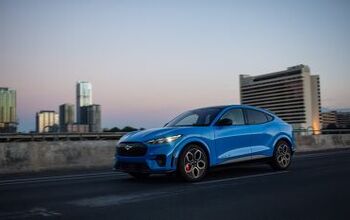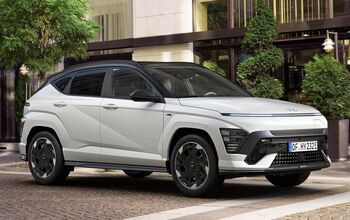So, Who's Winning the Midsize Sedan Battle?

In a shrinking segment increasingly dominated by two longstanding nameplates, the battle for sales supremacy is quickly resembling a U.S. election. Two main players, plus a handful of also-rans. (In Europe, this would be a very different — and probably quite confusing — affair.)
For all players in the U.S. midsize sedan market, it’s really a battle to hold on to market share, to keep sales from sliding further, as more and more customers look elsewhere for family transportation. Two Japanese offerings, the Honda Accord and Toyota Camry, loom over all other challengers. In November, one of these nameplates began putting some serious distance between it and its main competitor.
If you were rooting for the Accord, sorry. November was the next-generation 2018 model’s first full month on sale, but the Accord finished the month down 15.4 percent, year-over-year.
Some of the decrease could be due to slow deliveries of the new model to dealers, coupled with the disappearance of discounted 2017 models. 2018 Camry sales started at least a month earlier. So, we’ll have a clearer picture of this rivalry going forward. Still, the Accord’s trajectory was 180 degrees opposite that of the Camry’s, which closed the month with a 24.1-percent increase, year-over-year. In terms of volume, Camry’s 34,991 units beats the Accord’s 22,998 by nearly 12,000 vehicles.
Over the first 11 months of 2017, U.S. Camry volume tops that of the Accord by just over 43,000 units. Maybe buyers will fall in love with the stick shift over the holidays, leading to an Accord purchase in the New Year. That’s a big maybe. Design and handling is far more likely to play a role in any purchase.
Over at Hyundai, the brand’s refreshed 2018 Sonata just can’t find any traction. Despite edgier front and rear styling, Sonata sales sank 48 percent in November, year-over-year. Over the first 11 months of 2017, that translates into a 33.6-percent drop in volume. Sales of the Kia Optima were down 33.9 percent, year-over-year.
The Ford Fusion, which offers more drivetrain choice than any other midsize sedan, saw a 15.1-percent year-over-year sales drop in November, and a 22.1-percent drop in volume in calendar year 2017. Chevrolet Malibu sales dropped 27.8 percent in November, year-over-year, and the Buick Regal’s popularity dropped 55.3 percent as dealers await delivery of the next-generation 2018 model.
At Volkswagen, U.S. sales of the long-in-the-tooth Passat dropped just over 51 percent, year-over-year. Mazda’s 6 saw its worst sales tally since 2012 in November, with sales dropping 45.8 percent, year-over-year. It remains to be seen if the introduction of a turbocharged four-cylinder (due in 2018) can reverse the model’s sales slide.
Nissan’s Altima, still a high-volume sedan, recorded a much more modest YoY sales decline of 4.8 percent in November.
All in all, not a great month for any midsizer, with the obvious exception of the Camry. The sales performance of sedans from automakers not named Toyota or Honda gives credence to the theory that in a shrinking segment, the most well-known nameplates will survive the longest.
[Images: Honda, Toyota]

More by Steph Willems
Latest Car Reviews
Read moreLatest Product Reviews
Read moreRecent Comments
- 28-Cars-Later Say it ain't so, so reboot #6* isn't going to change anything?[list=1][*]V4-6-8 and High "Tech" 4100.[/*][*]Front wheel drive sooooo modern.[/*][*]NOrthSTARt.[/*][*]Catera wooooo.[/*][*]ATS all the things.[/*][*]We're *are* your daddy's Tesla. [/*][/list=1]
- MaintenanceCosts Can I have the hybrid powertrains and packaging of the RAV4 Hybrid or Prime with the interior materials, design, and build quality of the Mazda?
- ToolGuy I have 2 podcasts to listen to before commenting, stop rushing my homework.
- ToolGuy Please allow me to listen to the podcast before commenting. (This is the way my mind works, please forgive me.)
- ToolGuy My ancient sedan (19 years lol) matches the turbo Mazda 0-60 (on paper) while delivering better highway fuel economy, so let's just say I don't see a compelling reason to 'upgrade' and by the way HOW HAVE ICE POWERTRAIN ENGINEERS BEEN SPENDING THEIR TIME never mind I think I know. 😉



































Comments
Join the conversation
The new Accord is a visual obscenity. Even if it were heads and shoulders above the others in dependability and driving experience, which it isn't, it still wouldn't be a good buy.
Not apples to apple comparison between Toyota and Honda since Honda does not do fleet sales anymore e.g. rental companies.